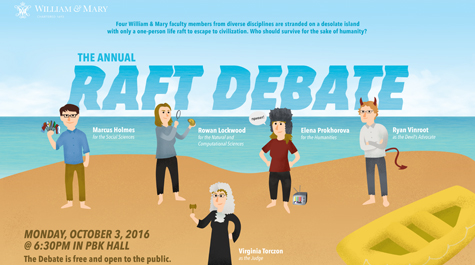Four professors, one raft: Who will survive?
The Raft Debate, a much beloved William & Mary tradition, will be held at 6:30 p.m. Oct. 3 at Phi Beta Kappa Hall. The event, sponsored by the Office of Graduate Studies and Research, the Graduate Center and the A&S Graduate Student Association, is free and open to the public.
During the debate, three survivors of an imaginary shipwreck — a scientist, a social scientist and a humanist — achieve a delicate balance between comedy and lecture as they debate the value of their respective discipline for the rest of humanity. Only one of these professors can return to civilization in the life raft. A fourth faculty member, a devil’s advocate, joins the survivors and argues sarcastically that none of the academic disciplines are worth saving. The winner of the debate is chosen by a judge based on audience reaction.
This year’s participants representing their disciplines and the fate of humanity are:
Humanities
Elena Prokhorova, Associate Professor of Russian Studies and Film & Media Studies
Born in the Soviet Union and educated in the US, Prokhorova is interested in the historical and cultural forces that shape our everyday experiences, social relations, understanding of selves and others. Her primary research focuses on the media and popular culture. She has published on the history of Soviet cinema and television, post-Soviet media and ideology, as well as a variety of genres of visual culture and the “work” they do in society. Prokhorova was a recipient of the Phi Beta Kappa Faculty Award for Excellence in Teaching and the Alumni Fellowship Award at the College. Her courses range from Russian and world cinema, to memory and mythology of WWII's Eastern Front, to the Russian language. She enjoys traveling, Vietnamese food, and occasional coding.
Social Sciences
Marcus Holmes, Assistant Professor of Government
Holmes studies international relations and specializes in diplomacy. He is particularly interested in understanding under what conditions personally meeting face-to-face with a leader from an enemy state can result in cooperation or exacerbate conflict. While a social scientist, Holmes is sympathetic to the natural sciences and even draws upon social neuroscience and biology to make many of his arguments. He runs the Political Psychology and International Relations Lab in which his students conduct independent and group research projects at the intersection of international politics and psychology. Holmes is also an avid marathoner and ultra-marathoner and hopes to complete a 50-mile race soon.
Natural and Computational Sciences
Rowan Lockwood, Professor of Geology
Lockwood is a paleobiologist who specializes in the effects of climate change and mass extinction in the fossil record. She and her students use data from fossil shellfish to predict how biodiversity in the oceans will respond to future changes in temperature, harvesting and ocean acidification. In the past three years, she has published in Science and Proceedings of the National Academy of Sciences, been awarded two National Science Foundation grants and been invited to present her work at the 2017 American Association for the Advancement of Science conference in Boston. Lockwood has won several prestigious awards during her career, including a British Marshall Scholarship, Thomas Jefferson Teaching Award, Plumeri Award for Faculty Excellence, and was named one of the top 300 professors in the U.S. by Princeton Review.
Devil's Advocate
Ryan Vinroot, Associate Professor of Mathematics
Vinroot joined the William & Mary Mathematics Department in 2008. His research is in representation theory and combinatorics, which is the math more like Dungeons & Dragons, rather than anything useful or applied, he said. He's pretty sure that's why he was asked to be the Devil's Advocate.
Judge
Virginia Torczon, Dean of Graduate Studies and Research, Arts & Sciences
For more information, visit the event's webpage or contact Chasity Roberts at cyroberts@wm.edu.















